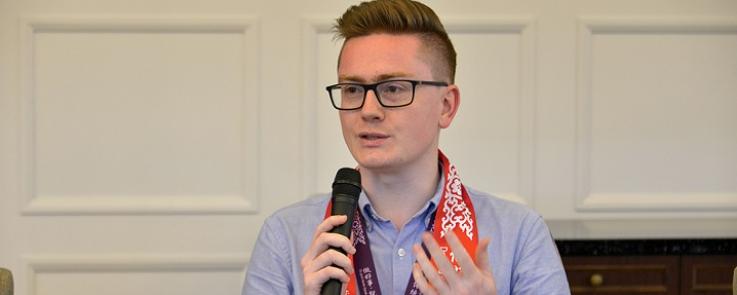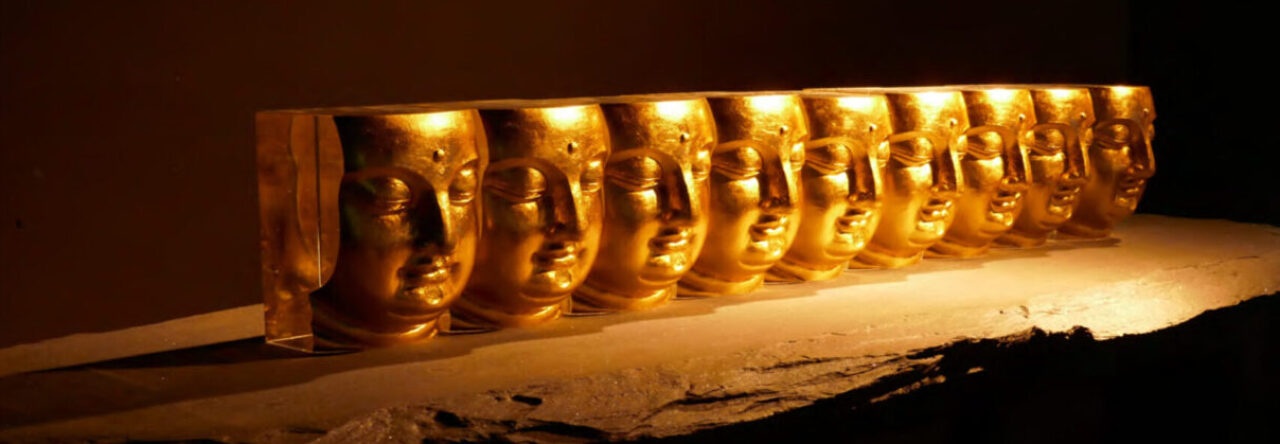Le lauréat de la bourse doctorale Sheng Yen pour l’étude du bouddhisme chinois moderne et contemporain, dans le cadre de la chaire Inalco – Sheng Yen, Stefan Kukowka, revient sur son parcours dans un entretien en anglais avec la Fondation Inalco. Il y parle de son cheminement, de son choix de rejoindre le programme doctoral Inalco – National Chengchi University, présente sa thèse et son point de vue sur l’étude des religions.
Stefan Kukowka, doctorant à l’Inalco, a été l’heureux lauréat d’une bourse d’étude dans le cadre de la « Chaire professorale pour les études sur le bouddhisme dans le monde chinois moderne » dirigé par le Prof. Zhe Ji afin de mener sa thèse.

Thesis topic: From Lotus Society (lianshe) to Amitābha Buddhist Society (jingzong xuehui) – An Analysis of the Interplay of Pure Land Soteriology and Confucian Morality in a Global Context
Thesis directors: Ji Zhe et Li Yu-Chen (National Chengchi University, Taiwan)
Could you introduce yourself and tell us about your academic career?
My name is Stefan Kukowka. I am currently enrolled as a PhD student at INALCO and the Graduate Institute of Religious Studies, National Chengchi University (NCCU), Taiwan. Many years before embarking on my PhD journey that has taken me to various countries and fascinating places, among others including Taiwan, Hong Kong, Germany, the United Kingdom, and France, I made the venturesome decision to study Sinology in an undergraduate programme at the University of Leipzig, Germany. Until the summer of 2012, shortly before the application deadlines for open-admission degree programmes, China was nothing more to me than a far-off country at the end of the horizon that appeared from time to time in the news. China and Chinese culture were so far from my centre of life that even the word ‘sinology’ was not really in my vocabulary. Yet, in the months before I made up my mind, I became fascinated with legendary tales of Daoists in the pursuit of longevity, meditative introspection and Buddhist reflection on the workings of the (monkey) mind, and the intricacies of Confucian rules of propriety as right conduct for the individual and society at large. A quick Google search provided me with directions and there I was, enrolled in a Sinology BA programme at the University of Leipzig. Both the linguistic challenge of learning Chinese and the intellectual possibility to get absorbed into the literature and writing, have fulfilled me ever since.
After having lived in Mainland China for a year and shortly before graduating, the next obvious step was a graduate programme. But where? Surely, I could have stayed in Germany or moved around in Europe, but I was determined to push my linguistic abilities and cultural understanding beyond daily conversations and concluded that this would only be feasible within the Sinosphere. A pro-and-con list has helped me in this process, and so I moved to Taiwan in 2016. After one year of intensive language studies at the Mandarin Training Center in Taipei, I ventured into a Chinese-taught MA programme at the Graduate Institute of Religious Studies, National Chengchi University. The challenges were immense, but the opportunities were manifold.
Why did you choose Inalco to follow your PhD, which you are doing in a joint doctorate programme with the National Chengchi University?
For me, it is less a ‘why’ than a ‘how’ did I choose INALCO. At the beginning of my second year at NCCU, I submitted a paper to the ‘Academic Forum on Buddhism and Contemporary China’ (fojiao yu jindai zhongguo xueshu luntan 佛教與近代中國學術論壇) organised by the Centre for the Study of Humanistic Buddhism at the Chinese University of Hong Kong in 2019 and was – contrary to my expectations – invited to present my paper titled ‘Confucian Morality and Rebirth into the Pure Land of Amitābha: The Compartmentalist Thoughts of Ven. Jingkong.’ After thought-provoking discussions and stimulating conversations with the other panellists and discussants, we were given a tour of the campus and the Fo Guang Vihara Hong Kong (xianggang foguang daochang 香港佛光道場).
During one part of the guided tour at the Fo Guang Vihara, Prof. Ji Zhe sat next to me and we entered a conversation about the temple, the conference, and my presentation. At some point he asked me, I do not remember the exact words, but it was something along the lines of ‘how is your French?’ Although I have always been interested in the French language and wished I would have learned it in High School, I was too focused on mastering Chinese, so French was not a top priority. I said, ‘I could probably order a coffee but not write a dissertation.’ Prof. Ji Zhe then asked me what I was thinking about pursuing a Cotutelle Doctorate Programme under his and Prof. Li Yu-Chen’s guidance at INALCO and NCCU. Following various emails with Prof. Ji Zhe after the conference and many weeks of reflection, I thought that choosing INALCO and NCCU for my PhD appeared to me as a unique opportunity, without the requirement to write the complete dissertation in French, two highly competent supervisors in the field of contemporary Chinese Buddhism whose books and articles I have read before knowing them personally, and with whom I could connect on a personal level and build up a trusting relationship,
Could you explain in a few words the subject of your thesis: “From Lotus Society (lianshe) to Amitābha Buddhist Society (jingzong xuehui) – An Analysis of the Interplay of Pure Land Soteriology and Confucian Morality in a Global Context”, and tell us the reasons why you chose this topic?
My PhD dissertation is a continuation of my master’s thesis that focused on a Taiwanese Buddhist group called Hwadzan Pure Land Society (huazang jingzong xuehui 華藏淨宗學會) that – unlike other larger Taiwanese Buddhist groups such as Fo Guang Shan, Dharma Drum Mountain and Tzu Chi – does not identify itself with the ‘humanistic Buddhism/ engaged Buddhism/ Buddhism in the Human Realm’ (renjian fojiao 人間佛教; the translation of this term depends on each group’s emic approach) movement. Rather, it advocates a distinct combination of a Buddhist Pure Land Soteriology with Confucian ethics that specifically addresses family ethics and the moral conduct of the individual to realise the ultimate objective of Pure Land practice, i. e. rebirth in Amitābha’s Pure Land.
Based on long-term fieldwork and interaction with this group during research for my master’s thesis, I have realised that the historical and global embeddedness of this group goes beyond the Taiwanese context and therefore my master’s thesis. From a historical perspective, although established relative recently in the late 1980s by Master Jingkong (1927-2022), Pure Land Societies join a long tradition of lay Buddhism that thrived during the Republican Era of China (1912-1949), particularly Lotus Societies that collectively recite the Buddha-name Amitābha and vow to be reborn into the Pure Land. From a global perspective, Pure Land Societies following Jingkong’s teachings were founded around the globe following Chinese migration patterns from Taiwan to Malaysia, Australia, the USA, and Europe in the last three decades. As each group operates relatively independent from the other, the flat hierarchy enables them to creatively integrate into different host societies. The name ‘Pure Land Society’ serves as an umbrella term and identification marker associated with and focused on Jingkong.
Thus, my thesis analyses the interaction of Chinese Pure Land Buddhism and Popular Confucianism, the development of Pure Land Societies from the Taiwanese context to a global context along with Chinese migration patterns, its activities, and positioning concerning different political environments as well as the popularisation of lay Buddhism outside of ‘classic’ monastic institutionalism, representing a new mode of practice of Chinese Buddhism. For this purpose, I have been conducting ethnographic fieldwork across Taiwan, Germany, and the United Kingdom. I am also planning to continue fieldwork in Malaysia, Australia, and France.
What would you like to share with people who may not be very familiar with Buddhism or the study of religions (Inalco students for example)?
Whether you consider yourself a religious/ spiritual person or not, or whether you think religion has played a positive or negative role throughout human history, it is unquestionable that since the dawn of time humans have engaged in activities that we now call religion, such as worship, prayer, and rituals to relate their lives to that which is beyond and to search for meaning. Although the answers are many and often contradictory, for the academic study of religion the point is not whether a doctrine is right or wrong, but rather to explore religious ideas from a variety of perspectives to learn how others understand purpose and existence. It deepens our understanding of ourselves and others. The study of religion can be what you make it! If you are interested in politics, history, sociology, literature, art, law, economics, ethics, etc., the study of religion can provide a comprehensive vantage point to understand how different communities of believers – past and present, near and afar – have used their religious traditions to shape and transform themselves and the society they live(d) in. It inspires intercultural skills, as you have to put yourself into the shoes of others. The multidisciplinary nature of the academic study of religion offers an abundance of opportunities to discover different disciplinary approaches and the connections among them, enhancing your analytical skills and effective communication.
I do not come from a religious family and never considered myself religious. Yet, during my undergraduate years, I became fascinated with societal phenomena, such as that the number of religious adherents exceeds the population in Japan or that most of the people in Taiwan claim not to be religious whilst regularly going to local temples to pray for all sorts of things. For a western spectator an apparent contradiction. But both examples show that our concepts of ‘religion’ or ‘faith’ may not work in different cultures, thus, challenging our preconceived notions of the ‘other’ and our world. After having lived in Taiwan for more than six years, sinology, the study of religion, and in particular Chinese Buddhism not only allowed me to master a foreign language and acquire intercultural and academic skills but also to broaden my horizon as a human being.
What are your next projects after your thesis?
I do have some ideas, but nothing concrete yet. At the moment, I’d rather focus on finishing my dissertation than paint a picture of what I could do in two or three years. Academia is changing fast and there are always new fascinating studies coming out. Let’s be patient and wait, as Buddhists would say, who knows where and when causes and conditions come together (yinyuan hehe 因緣和合)?
[Entretien avec la Fondation INALCO, pour un portrait publié sur le site de l'INALCO]

Laisser un commentaire